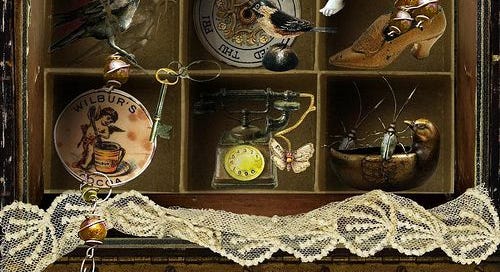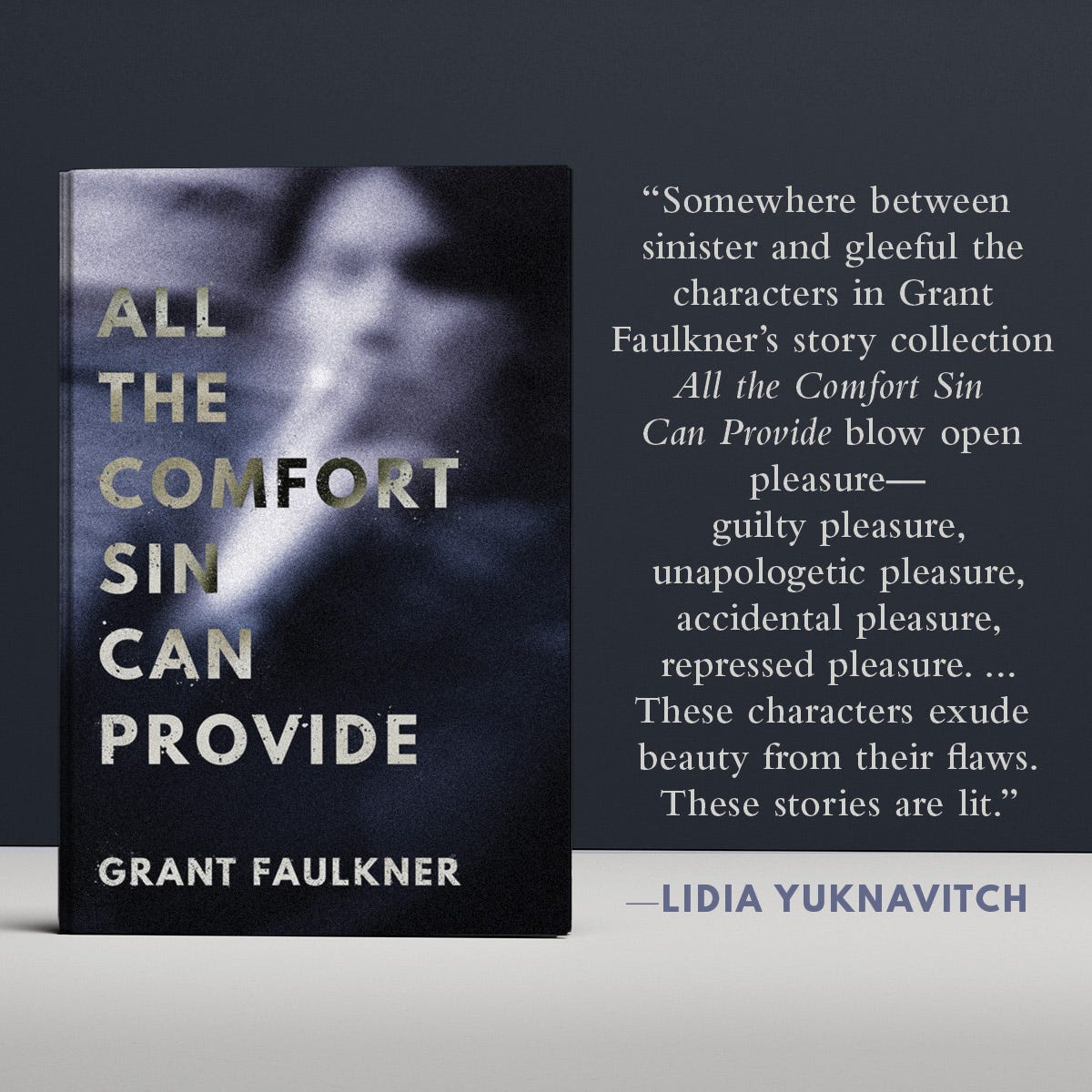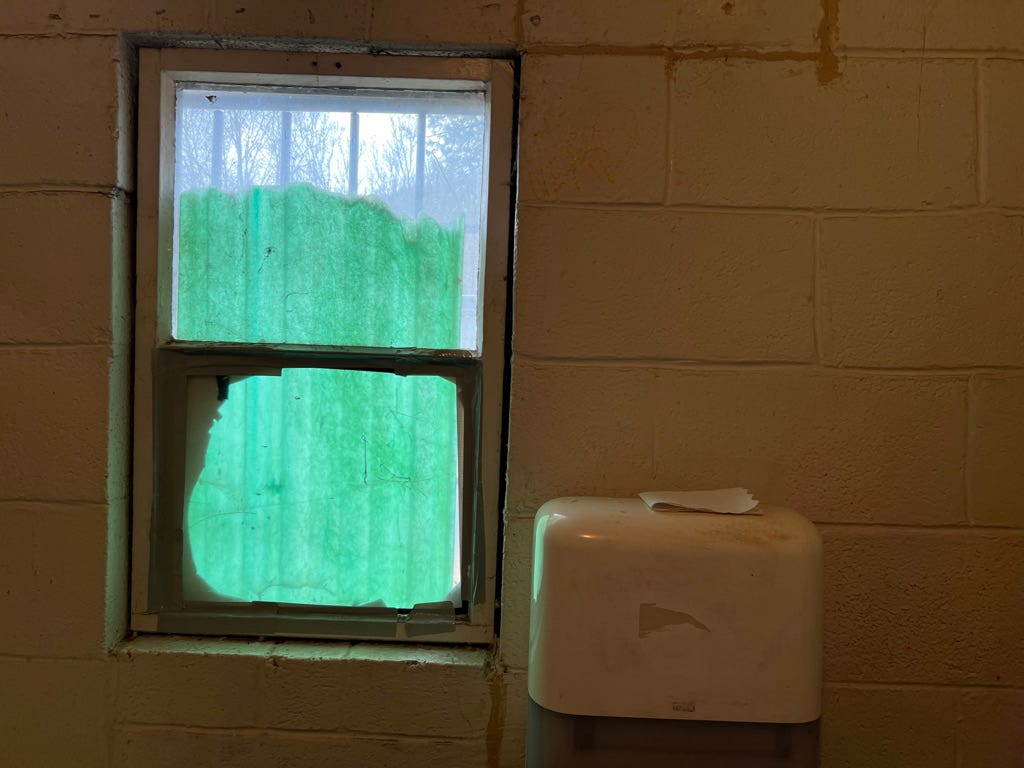Dear Readers,
I’m writing to you from rain-soaked Eugene today, where I gave a keynote speech at the fabulous Wordcrafters’ conference. It’s part of a Northwest book tour that started in charming Jacksonville, and now goes to Bend and then Portland.
I wasn’t able to write this newsletter ahead of time, so I thought I’d put together a grab bag of creative inspiration today—inspired by one of my favorite artists, Joseph Cornell.
Joseph Cornell was a storyteller who created narratives through bric- a-brac that he put together in boxes (see image up top). He’d walk aimlessly through the streets of New York City, finding discarded treasures for his art: cork balls, metal springs, old photographs, dime-store trinkets, and so on.
His art was defined by the hunt for the unwanted, for insignificant detritus, which he then archived and reassembled to make new worlds.
He filled cardboard storage boxes with his found treasures and organized them in the basement of his mother’s house, where he lived, as if they were in a museum’s back room, each of them labeled. A box labeled “tinfoil” or “plastic shells” resided alongside another marked “Caravaggio, etc.,” hinting at Cornell’s belief that great painters were no more important than the discarded objects of everyday life.
Cornell took these odd tools of his craft and made poetic “assemblages” or “shadow boxes,” known as “memory boxes” or “poetic theaters.” They were dreamlike miniature tableaux that revealed tiny, magical worlds full of parakeets, Renaissance portraits, Victorian knickknacks, maps.
I can’t create a majestic assemblage like Cornell, but I invite you to dance with your inner whimsy today, and to find inspiration in my own bric-a-brac …
The place where we cannot return
One definition of tragedy … and beauty: the presence of something that is impossible to experience.
“There is a Welsh word, hiraeth, which means a nostalgia for a place to which you cannot return. A new word, solastalgia, coined in the late Anthropocene, means a yearning for a landscape that no longer exists.”
―Florence Williams, Heartbreak: A Personal and Scientific Journey
Is longing a way of being there?
“Longing, we say, because desire is full of endless distances.”
—Robert Hass, Meditation at Lagunitas (one of my favorite poems)
On playing hooky from God
One definition of inspiration: a surrender to reality.
“On Sunday mornings I often attend a church in which I sometimes sat with my grandfather, in which I sometimes sit with my grandchildren, and in which my wife plays the piano.
“But I am a bad-weather churchgoer. When the weather is good, sometimes when it is only tolerable, I am drawn to the woods on the local hillsides or along the streams… In such places, on the best of these sabbath days, I experience a lovely freedom from expectations—other people’s and also my own.
“I go free from the tasks and intentions of my workdays, and so my mind becomes hospitable to unintended thoughts: to what I am very willing to call inspiration. The poems come incidentally or they do not come at all. If the Muse leaves me alone, I leave her alone. To be quiet, even wordless, in a good place is a better gift than poetry.”
—Wendell Berry
One definition of love
“Within ten minutes of meeting, we'd exchanged love letters from the corners of our eyes.”
―Forrest Gander, As a Friend
Another definition of love
“I am the least difficult of men. All I want is boundless love.”
—Frank O’Hara
Spare a dime to help me publish this newsletter?
Please consider becoming a paid subscriber.
Practicing the art of surrendering
“There is a necessity to be still sometimes and let life happen to you, to let your manner of being in the world be changed by what happens to you so that you will have a different self out of which to write.”
—Louise Glück
The story of what’s left out
“There's the story, then there's the real story, then there's the story of how the story came to be told. Then there's what you leave out of the story. Which is part of the story too.”
—Margaret Atwood
What is writing? Trying to write
“You see, in my view a writer is a writer not because she writes well and easily, because she has amazing talent.... In my view a writer is a writer because even when there is no hope, even when nothing you do shows any sign of promise, you keep writing anyway.”
—Junot Diaz
What do I know?
Montaigne wore a pewter medallion inscribed with the words, “Que sais-je?” which means “What do I know?”
Who proceeds through life with such a question now? We need more tolerance for uncertainty. We need more humility, which leads to more curiosity, which leads to love and knowledge.
The powers of uncertainty
“The quest for certainty blocks the search for meaning. Uncertainty is the very condition to impel man to unfold his powers.”
—Erich Fromm
A line I found in my notebook
I just found this line, written randomly in a notebook: “An accident isn’t necessarily ever over.”
It's a good way to think of life—of how an act always echoes, never truly ends.
A writing prompt?
Perhaps it’s a good writing prompt for today: write about an accident that never ends.
Human limits
In a recent global study, it turned out that absolutely no one knew how to spell “hors-d'œuvre.”
I’m available for book coaching and editing!
I love working with writers, and I have some space on my Writing Consult calendar if you’re looking for help.
I help people develop books and projects from scratch and sometimes do larger edits on finished manuscripts.
Lately, I've worked on novels, memoirs, and some short story projects. I’ve also worked on helping people figure out what kind of writer they are or want to be, and which projects can help get them there.
Contact me to find out more about my one-on-one work with writers.
If you’re in Portland on Wednesday!
I’ll be in conversation with Brian Benson at Broadway Books this Wednesday, February 26! Come on by!








Hahahaha about hors-d'œuvre, I tried it and failed.
An Accident That Never Ends
——
Okay, so here’s what happened.
I was walking, because of course I was walking—
I walk everywhere, it makes me feel
like a competent person who has their life together,
which, let’s be honest, I absolutely do not.
But I’m walking, and I’m thinking
about something very important,
like whether I should get my hair cut
because it’s been looking a little too “women’s studies professor” lately,
or maybe whether I should finally replace the lightbulb in the kitchen
that’s been out for two weeks because I refuse
to get on a stepladder,
not because I’m afraid of heights but because I don’t
trust myself not to fall
and end up in one of those freak accident obituaries
where people think, “Really? A stepladder? That’s how she went?”
And then—
then—
there’s a car.
Not a dramatic, screeching, movie-moment car,
but just a very ordinary, very beige, very tax-paying-citizen-type car
doing what cars do, which is existing in a place
that I had fully assumed
was only meant for me,
which is a very bad assumption,
as it turns out.
So there’s this moment,
this pause,
this cinematic freeze-frame
where my entire life flashes before my eyes—
and I don’t mean the highlights,
I mean the time I said “You too” to a waiter
who told me to enjoy my meal,
or that disastrous email I sent in 2006
where I used the phrase “circle back”
and have never forgiven myself.
And yet—
the accident never happens.
Or maybe it does, but very slowly,
like an existential fender-bender,
where you’re technically unharmed but still emotionally wrecked,
where you know this moment will linger,
haunt you in grocery store aisles and awkward silences,
remind you that you were here,
on this street,
with this car,
at this hour,
thinking about your stupid hair
instead of the crushing inevitability of mortality.
And the car honks.
And time unsticks itself.
And I step back,
safe, alive,
ready to go home and write about it
instead of doing anything
actually productive.